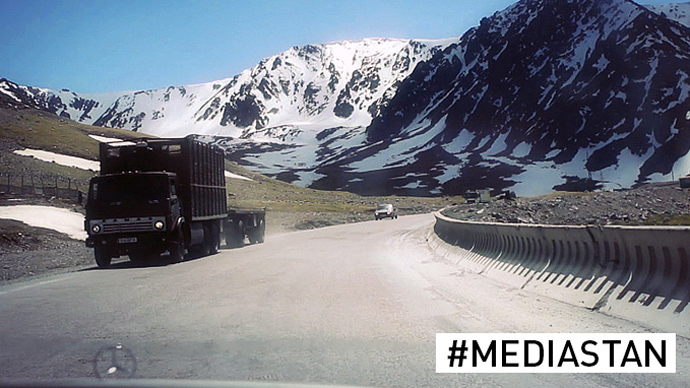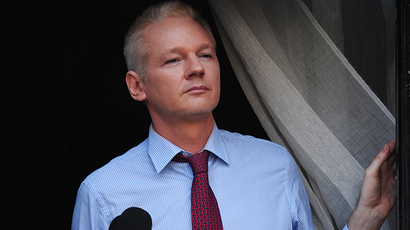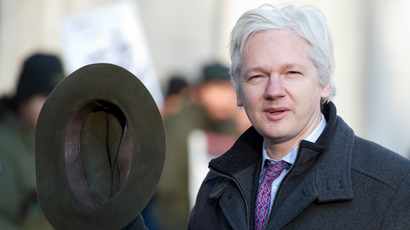US will cling to mass surveillance like nuclear weapons - Assange to RT
Julian Assange said there is “no hope” that mass strategic interception – as it is termed by the US – will go away. The whistleblower then drew a historical analogy with how the US has retained nuclear weapons in the past.
Assange’s comments were made during a panel discussion of the documentary film ‘Mediastan’ on RT. The panel also included director Johannes Wahlstrom and Afghan journalist Enayat Najafizada, who participated in the movie. The film depicts different stages in undercover WikiLeaks journalists’ trips across Central Asia.
“These powers do not give up voluntarily any significant ability to control the world like that,” Assange told RT. He compared any US compulsion to cling onto such abilities as a form of need for global control, pointing out that after the end of the Cold War, the US retained excessive nuclear weapons, despite an enormous anti-nuclear lobby. “Many movies were critical of it – it was a very expensive system to maintain,” he said.
“The US could have reduced its numbers without any significant problem, and yet it still has 5000-6000 nuclear weapons,” he said, adding that there was no need for the country to maintain such a large arsenal of nuclear weapons.
Assange also pointed out further reasons for not standing down from the clutches of the existing system, describing it as "invisible, intangible, complex, and decreasing in cost by 50 percent every 18 months."
Assange remained optimistic, stating that there has been a shift in the past few years.
“The internet has gone from a politically apathetic space to a new international body politic, which is just starting to find its feet. Edward Snowden was motivated largely by Bradley Manning, both by the success of his revelations and by the ill treatment of him in prison, demonstrating that the US government lacks moral authority and it is not possible to change the system from within. This very conversation is part of that process,” he said.
“So I am to a degree optimistic that there is a new international cultural consensus forming. It is largely embodied within the generation of young people between the ages of 15 and 35. And if it comes to a war between the older generation and the large body of the younger generation, the older generation is simply going to lose.”
“An important part of this process has been demonstrating that the old media organizations are simply a branch of the establishment power within their societies...we simply should not be surprised that The New York Times censors material, or that The Washington Post censors material, or the Guardian, or Central Asian Republic newspapers. They are power institutions. They have interests. What has gone on historically is that they have been very hypocritical institutions in pretending that they are always free to publish anything that is truthful and that the public is interested in. That is false and that is the illusion that needs shattering,” Assange added.

‘Mediastan’ was previously made available through the internet, as it dates back to 2011. However, it has not yet been released in cinemas.
While commenting on the success of the movie, Wahlstrom discussed the impact that WikiLeaks has had on the world.
“From a broader respect we can see that WikiLeaks’ releases have made a large impact and have changed the way we interact with media since then. If we just look at the whole NSA affair, which has gone on for the last half a year or so, it is a direct consequence of the WikiLeaks releases. And nowadays there is no direct censorship which is feasible by particular organizations,” he said.
“We are seeing the system where the ability for us to get access to this type of information is becoming much higher, and the price that we will have to be paying in the future would be much lower.”
Wahlstrom believes that privacy can be won back in a slow process of provoking conversation around the subject.
“Getting our privacy back is the same kind of question as getting democracy back, or freedom of information back. And in my point of view, this is a process you have to strive for more or less every day. And in that respect, there are many different things that can be done. But the most important part is building public awareness about these issues,” he told RT.
Journalist Najafizada, who agreed to take WikiLeaks information and attempt to publish it in Afghanistan, said his life was threatened while he was in possession of the material.
“For some time we decided to take these diplomatic cables from WikiLeaks and work with Afghan media organizations in Kabul and in many other provinces to publish, to make stories out of these cables. But unfortunately we later found out that having these materials with ourselves might be life threatening and would be difficult for Afghan media organizations to make stories out of them,” he said. “The risks to being a journalist in Afghanistan are so high. It is our responsibility to not give up.”















